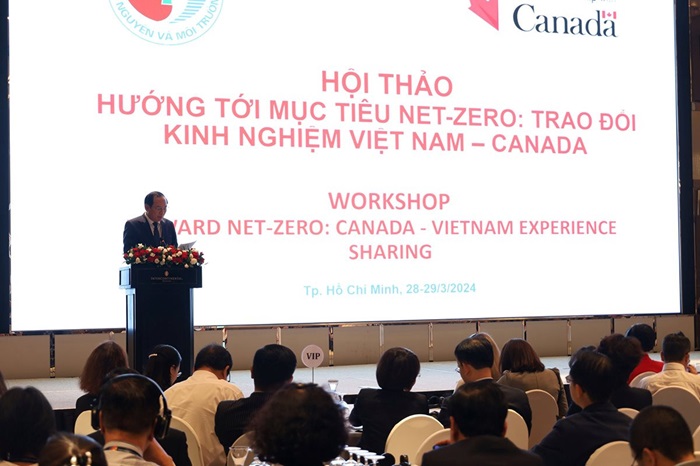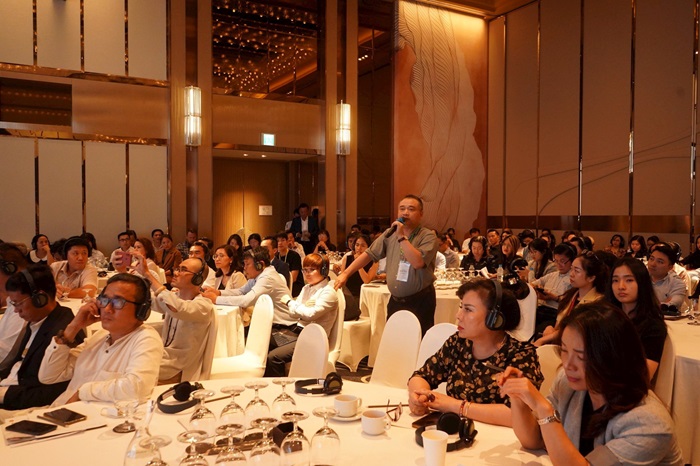(TITC) - On 28th March 2024, in Ho Chi Minh City, Canadian Embassy in Vietnam coordinates with the Vietnamese Ministry of Natural Resources and Environment (MONRE) organised Workshop Toward Net-Zero: Canada - Vietnam experience sharing.
Attending the Workshop were Ms. Mary Ng - Minister of Export Promotion, International Trade and Economic Development of Canada; Mr. Le Cong Thanh, Deputy Minister of MONRE; Representatives of ministries, industries, local governments, research organisations and commercial organisations from Canada and Vietnam...

Deputy Minister of MONRE Le Cong Thanh delivered the opening speech at the Workshop (Photo: MONRE)
Giving his opening remarks, Mr. Le Cong Thanh, Deputy Minister of MONRE said, green development, energy conversion, and emission reduction have become inevitable and irreversible trends globally. The Vietnamese government is making great efforts to both develop the economy and ensure the implementation of commitments and responsible contributions to climate change with the international community. Vietnam's National Climate Change Strategy to 2050 identifies strong greenhouse gas emission reduction measures with specific goals and roadmaps to achieve net zero by 2050.
Vietnam also updated its 2022 Nationally Determined Contribution (NDC) with an unconditional emissions reduction target of up to 15.8% by 2030 and a conditional target of up to 43.5% compared to the normal development scenario. These are all very ambitious but also challenging goals, requiring enormous financial and technological resources.
According to Deputy Minister Le Cong Thanh, to realise these goals, Vietnam has urgently taken action throughout the political, economic and social system. Firstly, Vietnam has adjusted and issued the National Electricity Development Plan for the period 2021 - 2030, with a vision to 2050, has set the goal of successfully implementing a just energy transition associated with modernising production, building smart power grids, advanced power system management, in line with the world's green transformation, emission reduction, and scientific and technological development trends. Oriented by 2050, the proportion of renewable energy will reach 67.5-71.5% of electricity production.
Second, Vietnam has strongly promoted the application of solutions on management, technology, equipment, and techniques for economical and efficient use of energy to save input energy costs and reduce production costs, increase business efficiency, and reduce greenhouse gas emissions…
Third, ministries, industries, and localities in Vietnam have been researching, developing, exploiting and using new energy sources, renewable energy, and clean energy such as solar energy, wind energy, hydropower, geothermal, biomass, green hydrogen,...
Fourth, all economic sectors have begun to comprehensively apply solutions to manage, exploit, and use resources economically and effectively in production activities, minimising waste into the environment and making the most of opportunities to apply circular economy models, sharing economy…
Fifth, Vietnam announced the "Political Declaration establishing a Just Energy Transition Partnership" (JETP) by the end of 2022 with the Group of international partners…
Deputy Minister Le Cong Thanh also said that the foundation of the green transition process includes energy transition, eliminating the use of coal and fossil fuels and developing renewable energy in Vietnam cannot become a reality without widespread cooperation between partners and countries in the region and globally.
Therefore, Vietnam wishes to continue to cooperate more deeply with Canada in energy transition efforts, eliminating fossil fuels, raising renewable energy targets and strengthening the adaptability and resilience of society and the economy as a whole; ensuring an effective green transition that is most beneficial for people and all participating organisations, partners and countries.
Speaking at the Workshop, Ms. Mary Ng - Minister of Export Promotion, International Trade and Economic Development of Canada highly appreciated Vietnam's efforts in the journey towards net zero emissions. As a comprehensive partner, Canada is committed to accompanying and supporting Vietnam in the transition to a circular economy, as well as being willing to share knowledge and experience on climate change, energy, renewables and carbon management, thereby further deepening bilateral relations.
In the coming time, both countries aim to promote connections between relevant agencies and businesses, enhancing shared interests in greenhouse emissions management, carbon markets, and technological innovations such as carbon capture and utilisation, signalling a promising direction for bilateral cooperation.
At the Workshop, delegates listened and discussed many important contents such as: climate change policy and Vietnam's commitment to net zero emissions; an overview of Canada's ecosystems, plans and actions towards net-zero emissions; Legislation on carbon management in some Canadian localities; Canada's Net Zero Emissions Responsibility Act and tracking progress on emissions reductions, and the role of specialised organisations in climate governance.
At the same time, delegates also attended the discussion "Clean energy transition: Strategies and policies on emission reduction" and “Reducing greenhouse gas emissions in the agricultural sector; had a round table discussion: "Opportunities for Vietnam - Canada cooperation".

Delegates attending Workshop discussing many issues about green development (Photo: MONRE)
According to the evaluation of the Organising Board, the results of the Workshop “Toward Net-Zero: Canada - Vietnam experience sharing” this time will promote dialogues and knowledge exchanges between Vietnam and Canada on topics related to climate change commitments, plans and goals in areas of mutual interest, including: carbon management, carbon market, carbon use and storage; decommissioning, reusing coal-burning plants and reducing greenhouse gas emissions in agriculture.
In addition, the workshop provided an opportunity to share perspectives, promote networking, and identify ways to apply Canadian expertise to support net-zero emissions commitments of Vietnam, as well as identifying cooperation opportunities between Canada and Vietnam, from both perspectives of development and trade cooperation.
Tourism Information Technology Center